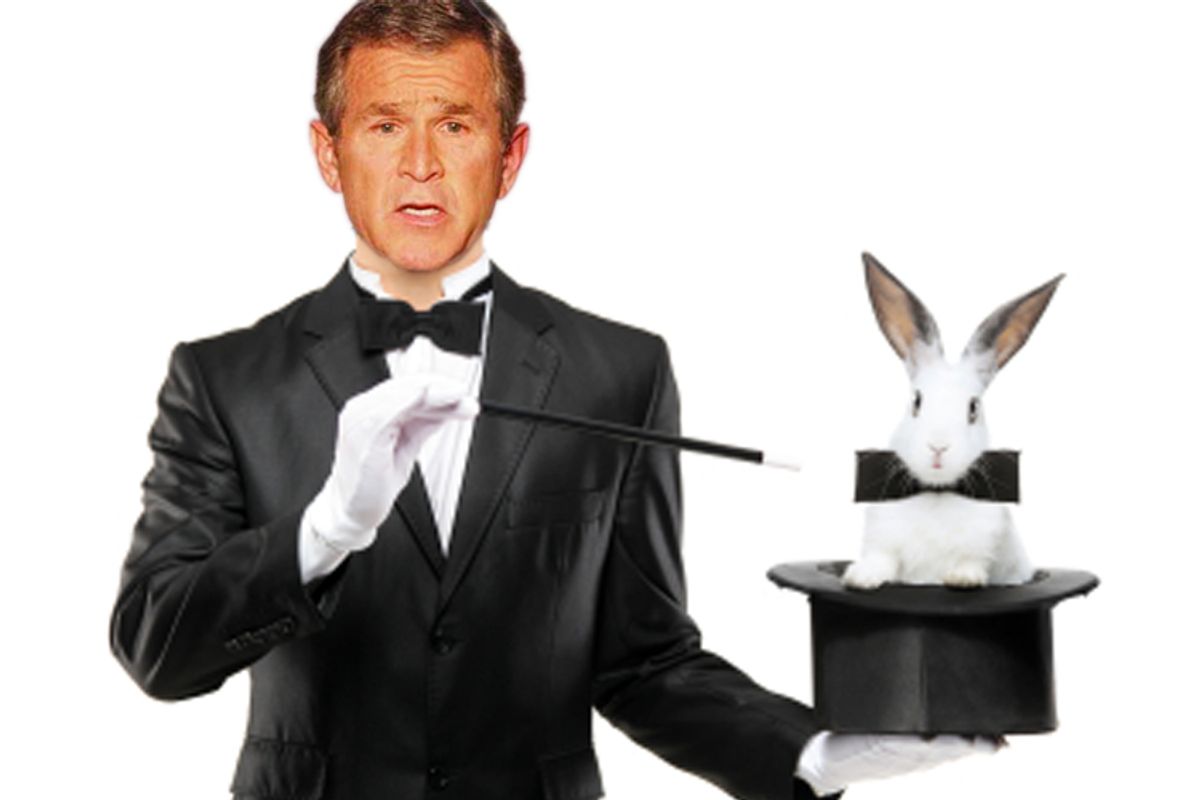The mystery has always been why any Democrat would have wanted to follow the catastrophic presidency of George W. Bush. To understand why, it's necessary to revisit ancient history, specifically 2001. Given today's TV- and Internet-shortened time horizon, that's almost like invoking the Napoleonic Wars, but bear with me.
Thanks partly to his skill at "triangulation" -- seeking middle ground between left and right -- President Clinton left a legacy of prosperity and balanced budgets. Republicans impeached him anyway.
Yeah, yeah, I know. Clinton's spectacular folly gave GOP hard-liners the excuse they'd spent his entire presidency looking for. That's not the point. To the Limbaugh-led, Confederate-accented Republican right, all Democrats are illegitimate. President Barack Obama often acts as if he doesn't understand that.
Anyway, let's stick to what's relevant today: taxes, spending and the U.S. economy. According to Congressional Budget Office projections, had the nation maintained the fiscal course the Clinton administration laid out, the national debt everybody rants about would have been retired by 2009.
See, that's the real cost of George W. Bush's magical thinking. By any rational accounting, Bush and the GOP Congress that gave him everything he wanted from 2001 to 2007 should be held responsible for the entire $10.6 trillion national debt -- along with the $1.3 trillion yearly deficit they handed to Obama, as well as the Wall Street crisis and bank bailouts.
It's that simple: With no Bush income tax cuts, no unfunded Medicare drug benefit, and no off-budget Iraq and Afghanistan wars, the U.S. balance sheet would have been in fine shape for his successor. Then government investment needed to rescue the economy from the doldrums wouldn't have seemed so alarming.
See, that's how Keynesian macroeconomics is supposed to work. Pay down the debt in good times, spend on job creation and tax cuts when people are hurting and the private economy's sucking wind. This mysterious "confidence" everybody talks about? What it amounts to is money in people's pockets. Economically speaking, there's no other kind.
Instead, heeding Dick Cheney's observation that "Reagan proved deficits don't matter," the Bush administration topped-up Scrooge McDuck's bullion pool. Now Scrooge funds think tanks paying store-bought "scholars" to argue that the massive debt they created is all the Democrats' fault for seducing grandma with socialist schemes like Medicare and Social Security.
Alas, history is notoriously unjust. Supremely confident, a shape-shifting opportunist like all truly gifted politicians, Obama came along at precisely the right time. Had the September 2008 Wall Street bubble burst even one year earlier, you couldn't find one of these Tea Party jokers north of Richmond, Va., with a search party.
Instead, Republicans pinned the blame on him. At times, Obama's acted the perfect pigeon, a high-minded poser who won't take his own side in a fight. Democrats hoping he'd confront Republicans holding the nation's economy hostage were kidding themselves.
When word of the president's debt-limit capitulation came down, historian Rick Perlstein ("Nixonland") posted a friend's hostile appraisal on Facebook:
"He's a one-trick pony, always has been, and that trick is performing judiciousness, reasonableness ... being able to agree with those with whom he supposedly disagrees and to disagree with those with whom he supposedly agrees."
"He's the LeBron James of American politics," I commented. "Comes up awesome in the second quarter of game two." As a basketball fan, I'm sure the president would know exactly what I meant: When push comes to shove, he folds.
More substantively, Nobel Prize-winning economist Paul Krugman wrote about "an inverse miracle of intellectual failure." Everything learned about macroeconomics since the Great Depression has gone for naught. Krugman predicts further economic stagnation as governments embrace austerity in the face of joblessness. Here in the United States, economic recovery ground to a halt after Obama's inadequate stimulus money ran out.
But maybe we're being too melodramatic. To continue my own metaphor, Obama might say that losing game two needn't mean losing the series. The agreed-upon budget cuts are back-loaded, hardly taking effect until 2013 -- after the next presidential election. They'll have little near-term economic effect.
In the meantime, no election-year hostage dramas. What Obama gave Republicans, they pretty much already had. Enacting progressive policies was impossible, given GOP control of the House.
Politically speaking, now they own the deficit. Wild talk about Obama the socialist big-spender will be limited to the Michele Bachmann/Froot Loop wing of the GOP. Also, the expiration of the Bush tax cuts, adding far more revenue than the White House's agreed-upon cuts, is built into the deal's baseline numbers. Obama holds a veto.
Not for nothing did Obama invoke President Dwight Eisenhower the other day. He's basically governed as a moderate Republican all along -- definitely not the kind of change his starry-eyed followers once believed in, but probably the best they can hope for come 2012.



Shares